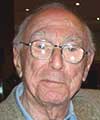A Founder of the Cognitive Revolution
 As one of the most influential cognitive psychologists of the 20th century, Jerome S. Bruner changed the public discourse – and policy – regarding education and how children learn. He is one of the founders of the “cognitive revolution” that transformed not only psychology but other fields related to the mind, such as anthropology, neuroscience, and linguistics. Many of his ideas, which may seem intuitive now, ran counter to the prevailing wisdom of the time, primarily his belief that learning is an active process. This principle pervades Bruner’s work: he emphasized the value of teaching children fundamental structure over facts, as it empowers them to actively participate in the quest for knowledge. He also controversially argued that any topic, when appropriately framed, can be taught effectively to children at any stage of development. Some of Bruner’s most influential cognitive research includes his concept that people use three systems to acquire knowledge: enactive, iconic, and symbolic (which are based on action, images, and language, respectively), as well as his emphasis on the importance of categorization in every facet of cognition, from perception to decision making. He later shifted focus to the larger cultural aspects of learning, such as the influence of social factors on a child’s perception and language development. Bruner’s current research focuses on the way we form and use narrative constructions of reality, especially in regard to cultural institutions like the law.
As one of the most influential cognitive psychologists of the 20th century, Jerome S. Bruner changed the public discourse – and policy – regarding education and how children learn. He is one of the founders of the “cognitive revolution” that transformed not only psychology but other fields related to the mind, such as anthropology, neuroscience, and linguistics. Many of his ideas, which may seem intuitive now, ran counter to the prevailing wisdom of the time, primarily his belief that learning is an active process. This principle pervades Bruner’s work: he emphasized the value of teaching children fundamental structure over facts, as it empowers them to actively participate in the quest for knowledge. He also controversially argued that any topic, when appropriately framed, can be taught effectively to children at any stage of development. Some of Bruner’s most influential cognitive research includes his concept that people use three systems to acquire knowledge: enactive, iconic, and symbolic (which are based on action, images, and language, respectively), as well as his emphasis on the importance of categorization in every facet of cognition, from perception to decision making. He later shifted focus to the larger cultural aspects of learning, such as the influence of social factors on a child’s perception and language development. Bruner’s current research focuses on the way we form and use narrative constructions of reality, especially in regard to cultural institutions like the law.
Watch Inside the Psychologist’s Studio: An Interview with Jerome S. Bruner





APS regularly opens certain online articles for discussion on our website. Effective February 2021, you must be a logged-in APS member to post comments. By posting a comment, you agree to our Community Guidelines and the display of your profile information, including your name and affiliation. Any opinions, findings, conclusions, or recommendations present in article comments are those of the writers and do not necessarily reflect the views of APS or the article’s author. For more information, please see our Community Guidelines.
Please login with your APS account to comment.